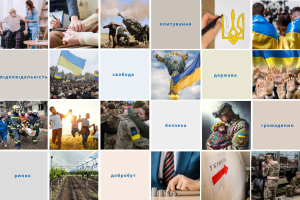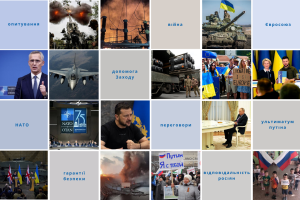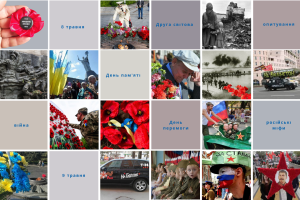The findings of a sociological survey conducted by the Ilko Kucheriv Democratic Initiatives Foundation in cooperation with the Razumkov Centre sociological service on 5-12 August 2022. Some questions were financed by the program Documenting Ukraine, conducted by the Institute for Human Sciences, Vienna (IWM)
The face-to-face survey was conducted in Vinnytsia, Volyn, Dnipropetrovsk, Zhytomyr, Zakarpattia, Zaporizhzhia, Ivano-Frankivsk, Kyiv, Kirovohrad, Lviv, Mykolaiv, Odesa, Poltava, Rivne, Sumy, Ternopil, Kharkiv, Khmelnytsky, Cherkasy, Chernihiv, Chernivtsi regions and the city of Kyiv. In Zaporizhzhia, Mykolaiv, Kharkiv regions the survey was conducted only in the territories controlled by the Ukrainian government and where there are no combat actions.
The survey was conducted in 112 settlements (57 urban and 55 rural) by stratified multistage sampling using random sampling at the first stages of sampling and quota sampling at the final stage (when respondents were selected by gender and age quotas). The sampling structure represents the demographic structure of the adult population in the territories where the survey was conducted at the beginning of 2022 (by age, gender, and type of settlement).
2.024 respondents aged 18 years and older were surveyed. The theoretical error in sampling does not exceed 2.3%. At the same time, additional systematic deviations in sampling may be due to the consequences of Russian aggression, in particular the forced evacuation of millions of citizens.
Composition of macroregions:
- The West – Volyn, Zakarpattia, Ivano-Frankivsk, Lviv, Rivne, Ternopil, Chernivtsi regions;
- The Center – Vinnytsia, Zhytomyr, Kyiv, Kirovohrad, Poltava, Sumy, Khmelnytsky, Cherkasy, Chernihiv regions and the city of Kyiv;
- The South – Mykolaiv and Odesa regions;
- The East – Dnipropetrovsk, Zaporizhzhia, Kharkiv regions.
Attitude to the Soviet Union and its legacy
- 67% of the respondents positively assess the disintegration of the Soviet Union. The share of those who have a negative attitude to the disintegration of the USSR is 16% and is approximately equal to the share of those who have not decided on their attitude to this historical event (17%).
- Compared to 2020, Ukrainians have become much more positive about the disintegration of the Soviet Union. Over two years, the share of those who positively assessed the collapse of the USSR increased by 18%, while the negative assessment of this event decreased by 16%.
- The vast majority of respondents in all age categories assess the disintegration of the USSR positively. The highest number of those satisfied with the disintegration of the Soviet Union was observed among the citizens who did not live in those times or witnessed the end of the USSR in their young age. Among the youngest age group, 70-72% of respondents positively assessed the disintegration of the Soviet Union. The lowest share of those who positively assessed the collapse of the USSR was recorded among citizens over 60 years old. Ukrainians born after 1991 are the least nostalgic for the Soviet Union and do not want its restoration.
- The sorrow over the collapse of the USSR is most widespread among Ukrainians who now live in the southern macro-region - 29%. The same share of people in the South of Ukraine does not have a clear position on this issue. However, the majority of the Southern residents are still satisfied with the collapse of the Soviet state (42%).
- Citizens with higher income and better education are more supportive of the disintegration of the USSR compared to citizens with lower income and less education. For instance, among respondents with higher education the share of those who are positive about the collapse of the Soviet Union is 11% higher than the share among the respondents with secondary education. Similarly, citizens with higher incomes are more likely to be positive about the collapse of the USSR than those with lower incomes.
- The absolute majority of respondents, regardless of the language of everyday communication, consider the collapse of the Soviet Union a positive event. Among Ukrainian-speaking Ukrainians this attitude was shared by 74%, among Russian-speaking Ukrainians - 52%.
- 59% of Ukrainians support the decision to condemn the USSR as a communist totalitarian regime. Only 13% of respondents have a negative attitude to this decision of the national government. 15% of respondents said they did not care, and 14% could not answer the question.
- Compared to 2020, support for the decision to condemn the USSR as a totalitarian, repressive regime has increased by 25%. Moreover, over two years, the share of respondents who disapprove this decision of the central authorities has decreased by 19%.
- Among the citizens aged older than 60, the highest level of disagreement with the condemnation of the totalitarian regime of the Soviet Union remains (20%). Nevertheless, the vast majority (≥50%) in this age group, as well as in younger age groups, considers the decision to condemn the USSR justified.
- The most controversial attitude to the condemnation of the USSR is observed in the South of Ukraine. 25% of the respondents in this region support the decision to condemn the USSR, 27% oppose such a decision, 22% indicated that they do not care, and 25% could not answer the question.
- As in the question about the attitude to the collapse of the Soviet Union, respondents with higher income and higher education are more likely to condemn the USSR. 64% of respondents with higher education supported the decision to condemn the USSR, while among respondents with general secondary education, this figure is 50%. Among the citizens who are financially secure, the decision to condemn the USSR as a communist totalitarian regime is supported by 62% of respondents, while among the citizens who reported a worse financial situation, the share of support is 41%.
- Among those who positively evaluate the disintegration of the Soviet Union, 78% clearly support the condemnation of the USSR for its state terror. Among citizens who have a negative attitude to the collapse of the USSR, the question of whether the Soviet Union was a totalitarian state that resorted to terror is less clear. 16%, despite regretting the collapse of the USSR, positively assessed the decision to condemn him, 44% opposed such a decision, 21% said they did not care, and 18% could not answer the question.
- Almost 57% of respondents support the idea of renaming streets and squares associated with the Russian Federation, the Russian Empire and the Soviet Union. Thus, the majority of Ukrainians are favorable to the initiatives of local authorities to rename toponyms associated with Russia.
- Negative attitude to renaming prevails only in the Southern regions of Ukraine: 42% oppose the renaming, 27% support the renaming, 18% say they do not care and 13% could not answer the question. In the East, which is not currently under occupation, the majority (44%) supports the decommunization and de-Russification of the streets, while two times fewer respondents (24%) are against it. In the Central and Western regions, the absolute majority also supports the renaming of place names.
- Among younger, formally more educated and wealthier citizens, renaming streets and squares finds more support than among older, formally less educated and poorer citizens. However, among all these categories of citizens, positive attitudes towards renaming absolutely prevail over negative ones.
- A relative majority (39%) of the respondents who identified Russian as their mother tongue also support the decommunization and de-Russification of toponyms, while one-third of such respondents (33%) oppose it.
- Respondents who negatively evaluate the collapse of the Soviet Union are mostly negative (52%) towards decommunization and de-Russification. However, one in five of them (21% of respondents in this category) is still ready to support the renaming of streets, another 20% answered that they do not care.
Nationalism and “good Russians”
67% of respondents agree that “healthy nationalism” is needed. Over the years, the share of Ukrainians who see the importance of nationalism only increases with a parallel decrease in the share of people who do not support this opinion.
- The vast majority of Ukrainians in all age groups, regardless of gender, level of education, financial situation or language of everyday communication, support the need for “healthy nationalism”. For instance, the thesis about the need for nationalism is supported by 51% of Russian-speaking respondents, 21% of them disagree with this statement. Among the Ukrainian-speaking respondents, 74% agree with the need for nationalism, 7% disagree.
- Among the residents of all macroregions, only in the South the absolute support for the thesis that Ukraine needs “healthy nationalism” is not observed. In Mykolaiv and Odesa regions, 37% agreed and 34% disagreed with the statement about the need for nationalism
- Almost 50% of the Ukrainian citizens positively assess the figure of Stepan Bandera. 11% of respondents spoke negatively about the role of Stepan Bandera in the foundation of the Ukrainian statehood.Another 19% indicated that they have a mixed attitude to the role of Stepan Bandera. About 18% could not answer this question. And only 2% of respondents said they had not heard of the historical figure of Stepan Bandera.
- Compared to the previous year, the share of respondents who positively assessed the historical role of Stepan Bandera increased by 19%. At the same time, the share of respondents who assessed it negatively decreased by 21%.
- The prevalence of negative assessment of Stepan Bandera's historical figure is observed among the residents of the South of Ukraine. 30% of the respondents in Odesa and Mykolaiv regions assess his historical role rather negatively and 20% of respondents assess it positively. 9% did not know who Stepan Bandera was at all. In other macro-regions, the share of those who do not know about Stepan Bandera at all did not exceed 2%
- Citizens of all age groups, regardless of their level of education or financial status, mostly positively assess the historical role of Stepan Bandera. However, younger Ukrainians, as well as those respondents with higher education and higher income are more supportive in their assessments of historical figure or Stepan Bandera's than older people and those with secondary education and low income.
- For 29% of respondents who speak Russian in everyday life, the figure of Stepan Bandera is mostly positive. 20% of respondents disagree with this.
- Among those who have a negative attitude towards the collapse of the Soviet Union, 24% still positively assess the role of Stepan Bandera, another 19% indicated that they have both positive and negative attitudes towards his role. However, the relative majority of the USSR supporters (32%) still tend to assess Bandera's role negatively.
- The majority of Ukrainians (56%) believe that Russians are collectively responsible for Russia's military aggression against Ukraine. Only 18% agree that the war does not depend on the choice of ordinary Russians.
- 67% of Ukrainians in the Western regions, 59% in the Central regions, 43% in the Eastern regions, and 42% in the Southern regions agree with the responsibility of Russians for the consequences of the Russian war against Ukraine. 27% in the Southern regions and 23% in the Eastern regions disagree with the collective responsibility of ordinary Russians.
- As with the statement about the necessity of nationalism, putting the responsibility for the Russian war against Ukraine on ordinary Russians is supported by the majority of respondents, regardless of gender, age, education or financial status.
- Among respondents who communicate in Russian in everyday life, a relative majority (47%) also believes that the war is the result of actions or lack of actions on the part of ordinary Russians. 22% of respondents disagree with this statement.
Perception of the role of the Ukrainian Orthodox Church of the Moscow Patriarchate in the Russian-Ukrainian war
- 52% of respondents agree that the activities of the Ukrainian Orthodox Church (Moscow Patriarchate) rather encourage Russian aggression. There are only 11% of those who believe that the UOC (MP), on the contrary, contributes to the defense of Ukraine.
- For most citizens, regardless of their age, region of residence, level of education or financial situation, the UOC (MP) is rather a threat to the sovereignty of Ukraine.
- However, among the residents of the South and the East, a significant share is unsure whether it is really worth evaluating the church in terms of its role in the war. 60% of citizens living in the Southern regions and 57% of those living in the Eastern regions disagreed that the UOC (MP) strengthens or harms the defense of Ukraine. A similar position is shared by 49% of respondents who speak Russian in everyday life.








